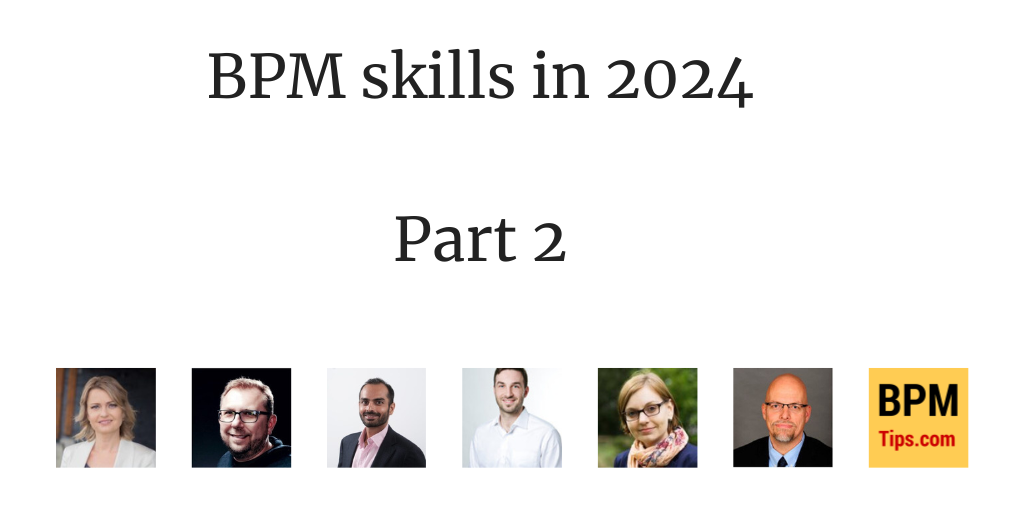Do you want to learn more about BPM skills in 2024? Part 2 of the post is ready!
Below you can find the answers from the following experts:
Sasha Aganova
BJ Biernatowski
Thomas Hildebrandt
Sandeep Johal
Morten Marquard
Jan Mendling
Amy Van Looy
Roland Woldt

Now, let’s dive into the answers.
Sasha Aganova
 Sasha Aganova brings innovative ideas to the intersection of new forms of business processes, business design, and cultural transformation. Her forward-thinking, pragmatic approach to today’s challenges is based on over 20 years as a leader of business process modernization. This approach was developed while working with diverse companies around the world to improve their ways of operating.
Sasha Aganova brings innovative ideas to the intersection of new forms of business processes, business design, and cultural transformation. Her forward-thinking, pragmatic approach to today’s challenges is based on over 20 years as a leader of business process modernization. This approach was developed while working with diverse companies around the world to improve their ways of operating.
Sasha writes thought-provoking articles for publications like BPTrends and the Huffington Post. She enjoys sharing her knowledge with the broader community at conferences as a frequent presenter, and keynote speaker. In addition to her consulting and training work, Sasha is also currently teaching an undergraduate-level course in Integrated Systems Design at the University of Toronto.
WWW: LI profile
What is the impact of GenAI on process management?
The rise of generative AI will have a transformative impact on business process management. By automating numerous aspects of BPM, generative AI can substantially reduce project timelines and improve the quality of deliverables. During gathering of the current state, generative AI can rapidly synthesize explicit knowledge about existing processes and detect terms inconsistencies. For analysis, it can facilitate data analysis, perform risk assessment, and generate insights. When redesigning the future state, generative AI can be used to enable rapid ideation. For implementation, it can generate procedures, training content, and onboarding materials. Finally, for continuous improvement, it can provide knowledge at the fingertips to support activities. With capabilities spanning the entire BPM lifecycle, generative AI promises more efficient and effective process improvement initiatives. This evolution will require rethinking some BPM methodologies, but holds great promise for transforming how organizations manage, optimize and innovate their processes.
What are the skills, techniques, behaviors, and attitudes that can help BPM practitioners create value for their organizations in 2024?
I believe the impact of generative AI on business process management will be similar to the impact of robotics on manufacturing. It will provide a tool to make work faster and more efficient. However, deep expertise will still be required to understand the processes that need to be improved. The core skills that have always been critical in BPM will remain the most important in 2024. These include curiosity to ask insightful questions, thinking strategically about the big picture while also mastering the details, learning agility, stakeholder engagement, and synthesizing information into actionable insights. While generative AI will transform how process improvements are executed, human skills like curiosity, critical thinking, understanding of cultural environment and values of the parties, collaboration and analysis will be indispensable. The professionals who thrive will combine their human strengths with the power of AI to drive impactful process innovation.
What are the best resources to learn those skills? (e.g. books, articles, courses)
The skills I mentioned—curiosity, critical thinking, collaboration, and analysis—are not easily developed from books alone. Like playing the piano, they are skills honed through extensive hands-on practice and mentorship. No amount of reading or watching videos can substitute for actively applying these skills under the guidance of experts. Aspiring business process management professionals should seek out mentors in the industry and immerse themselves in real-world experiences that exercise their ability to ask probing questions, think creatively, engage stakeholders, and synthesize insights. Only through practice can they develop and transform conceptual knowledge into mastery of the core skills that drive impactful process innovation. There are no shortcuts when developing the human capabilities that will remain indispensable alongside generative AI. Dedication and experience are key.
Which skills are no longer relevant or not practically applicable yet (hype)?
Any previously acquired skill can be useful when applied appropriately. All skills are tools in your toolbox—some used more often than others, but none completely obsolete. In business process management, I cannot identify any skill that has become entirely useless. There are no single solutions for everything, just as few skills are truly redundant. The most valuable skills are those leveraged thoughtfully in the right contexts. With experience, professionals gain wisdom about when and how to apply their capabilities. An open mindset enables transferable skills to remain relevant amidst changing environments. Rather than declaring skills useless, effective process managers find creative ways to extract value from diverse capabilities.
BJ Biernatowski
 BJ Biernatowski is a BPM Practitioner with over 20 years of technology experience. He has practical expertise implementing Low Code DPA platforms including Microsoft Power Platform on large scale business transformations.
BJ Biernatowski is a BPM Practitioner with over 20 years of technology experience. He has practical expertise implementing Low Code DPA platforms including Microsoft Power Platform on large scale business transformations.
BJ is a Process and Execution Manager on Microsoft’s Global Finance Operations Team.
KM World has featured BJ’s work, and he has presented internationally on workplace transformations of Fortune 500 companies.
In his spare time, he is coauthoring a new book titled “Mastering Digital Change by Transforming Business with Analysis and Modeling”.
WWW: LI profile
Twitter: @bjbiernatowski
What is the impact of GenAI on process management?
Artificial Intelligence (AI) overall will play a critical role in shaping the landscape of Digital Change programs. It will transform organizations by:
1. Further consolidating and bringing together AI, DPA & RPA, self-learning, adaptability, decision management, and global infrastructure into one hybrid Cloud platform.
2. Breaking architectural patterns that rely on centralized decision management and pushing GenAI-enabled bots into previously unreachable ‘corners’ of workflow management ecosystems. Envision an organization with multiple versions of its operations embedded as ‘process blueprints’. These bots will be capable of deploying different scenarios based on situational awareness and changing market conditions.
3. Shifting the focus from process-based workflow optimization to one focused on business outcomes and adaptability. While prior generations of DPA platforms have touted this benefit, the infusion of AI into multiple layers of the tech stack will finally deliver on this vision.
4. Introducing advanced pattern recognition to aid document management and unstructured data processing, improving accuracy and speed of critical decision-making during process execution.
5. Traditional process analysis and discovery projects will get a second life making companies reconsider which approach to take during Discovery. Process Mining will lose a bit of its luster as the work of Copilot enabled Citizen Architects and Developers starts generating unprecedented results.
What are the skills, techniques, behaviors, and attitudes that can help BPM practitioners create value for their organizations in 2024?
1. As AI starts assisting practitioners in their daily lives, adjusting to working alongside the machines will require taking a fresh look at what the actual job is. I do not see machines as competitors taking our jobs, but more as amplifiers of professional skillsets. In the age of AI, skillsets and experience still matter.
2. AI will accelerate the progress of mundane and effort-intensive project activities, leaving enough time for strategy, business, and process architecture. In the past, projects may have been consumed by difficult phases like discovery and analysis, sometimes pushing the ultimate project end goal into secondary focus.
3. With Copilot’s assistance, more challenging cognitive tasks will get an uplift, allowing teams to test hypotheses and explore problem solutions more holistically and much quicker.
4. Knowing the craft inside out will still matter in the world where machines can reason over vast data sets quickly. Knowing vs. being able to connect different business scenarios still requires critical thinking and solid process skills – so humans will always be in the loop.
5. Staying on top of the BPM Common Body of Knowledge (CBOK). This will be so much easier with Copilot.
6. Problem-solving, collaboration, adaptability, communication, resilience, and digital detox to navigate upcoming changes with a positive and refreshed mindset.
Which skills are no longer relevant or not practically applicable yet (hype)?
1. Support for Six Sigma methodology, with its rigid structure and focus on precision, seems to be waning in the context of knowledge work. Involvement of Six Sigma consultants in process transformation projects usually means delays, despite the wealth of science brought in. Six Sigma may come back built into process management frameworks.
2. Documentation. Excessive documentation, especially in the form of lengthy process manuals, is no longer practical. Instead, concise, and visual process models are favored for ease of understanding. Rely on Copilot and similar chatbots for details.
3. Separation of IT and Business Teams: While not a skill, the siloed approach between IT and business is outdated and, in today’s world, artificial. Collaboration and cross-functional understanding are essential for successful BPM driven Digital Transformations. Citizen Developer platforms continue to bridge this gap.
Prof. Thomas Hildebrandt
 Thomas Hildebrandt has since 2018 been full professor at the Department of Computer Science, Copenhagen University and founder of the research section for Software, Data, People and Society. Thomas has been working as PI and co-PI on inter-disciplinary research and development projects jointly with industry partners in the area of technology and methods for business and workflow management systems for more than 20 years and has and has been a senior PC member of the BPM Conference for several years. Thomas initiated the research on DCR Graphs in 2008 and has since then led the research in collaboration with his research groups and Morten Marquard, the CEO at DCR Solutions. Thomas is also an active speaker on AI and digitalization for industry and public sector organisations and is member of the Danish Standards group for AI, who is part of the European (CEN/CENELEC) and Global (ISO) standardization bodies.
Thomas Hildebrandt has since 2018 been full professor at the Department of Computer Science, Copenhagen University and founder of the research section for Software, Data, People and Society. Thomas has been working as PI and co-PI on inter-disciplinary research and development projects jointly with industry partners in the area of technology and methods for business and workflow management systems for more than 20 years and has and has been a senior PC member of the BPM Conference for several years. Thomas initiated the research on DCR Graphs in 2008 and has since then led the research in collaboration with his research groups and Morten Marquard, the CEO at DCR Solutions. Thomas is also an active speaker on AI and digitalization for industry and public sector organisations and is member of the Danish Standards group for AI, who is part of the European (CEN/CENELEC) and Global (ISO) standardization bodies.
WWW: LI profile
What is the impact of GenAI on process management?
GenAI is presently at the top of the hype curve and lots of resources are used trying to find useful applications of the technology that can be trusted beyond pilots. This may lead to a lot of sub quality solutions and delay the advancement of more useful improvements of process management.
When the hype settles I think the technology can help experts to speed up tasks related to production of context, in domains where they can easily spot mistakes, e.g for the generation of process models from textual descriptions. It may also help providing useful conversational interfaces to workflow and business process management systems, although the technology at this point still suffer from hallucinations and mistakes.
What are the skills, techniques, behaviors, and attitudes that can help BPM practitioners create value for their organizations in 2024?
I strongly believe that BPM practitioners can create tremendous value for their organizations by learning how to capture the knowledge behind business processes using modern declarative process notations supported by both process mining, design tools and execution engines, such as Dynamic Condition Response (DCR) Graphs combined with Decision Model and Notation (DMN), instead of keep trying to capture process flows with standard imperative flow-graphs such as BPMN.
As long as the practitioners stick to flow-graphs they will suffer from too rigid processes that cannot be easily updated when business policies or regulations change and only be able to support the most predictable and stable processes.
With declarative models one can at the same time automate small rigid sub processes and the knowledge processes that ties them together – and adapt to ever changing contexts and regulations, thereby reach the level of “hyperautomation”.
What are the best resources to learn those skills? (e.g. books, articles, courses)
Declarative process modeling and process mining with DCR Graphs have been described in many research articles at the yearly BPM and ICPM conferences on respectively Business Process Management and Process Mining. This conferences are highly relevant! ICPM 2024 will be in Copenhagen which is also the home of the DCR research teams and the DCR Solutions company developing the DCR tools.
We are currently writing on two books on DCR Graphs planned to be published later 2024 – one providing a coherent introduction to the DCR modeling notation (and the interplay with DMN), a method for declarative modeling and the tools available at DCRsolutions.net – the other one providing a light introduction and several example of the use of DCR Graphs provided by domain experts using the notation with the NEC WorkZone Enterprise Information System widely used within the Danish public sector but also being marketed in UK and Australia. Until the books come out I can recommend creating a free trial account at DCRSolutions.net and looking into the substantial online documentation available.
Which skills are no longer relevant or not practically applicable yet (hype)?
I think most classical BPM skills are still relevant and will stay relevant- but they are limited to rigid and stable processes and not feasible for knowledge processes. I do not think generative AI has proven to be practically applicable for anything truly transformative in BPM yet.
Sandeep Johal
 Sandeep is a Managing Director & Principal Consultant at Nano Business Technology with over 15 years of Business Process Management and Digital Transformation experience, specifically in enterprise wide system implementation process design, process improvement, strategic sourcing, capability uplift, strategy alignment, thought leadership in energy, utilities & resources; finance; and government bodies across Australia, New Zealand, Middle East, and North America
Sandeep is a Managing Director & Principal Consultant at Nano Business Technology with over 15 years of Business Process Management and Digital Transformation experience, specifically in enterprise wide system implementation process design, process improvement, strategic sourcing, capability uplift, strategy alignment, thought leadership in energy, utilities & resources; finance; and government bodies across Australia, New Zealand, Middle East, and North America
Sandeep’s consulting takes him to both national and international destinations including the Americas, Middle East, New Zealand and the UK. He is often invited to speak at national and international conferences and is regarded as a contributor to the Business Process Management body of knowledge. He holds a Masters in Information Technology (BPM), an honours in Business Management and a diploma in Mechanical Engineering.
WWW: LI profile
WWW: Company website
What is the impact of GenAI on process management?
The impact of GenAI will be widely felt in every discipline with process management being no different. The value added by GenAI is enormous and should be viewed as a formidable tool to achieve results. As such, process practitioners should be open to learning and changing the way they deliver results. Organisations will have less funds and time to achieve grand process outcomes. For the first time, process practitioners have the opportunity to enable AI to do the ‘heavy lifting’ (e.g. quantitative analysis of big data) while deriving important (and novel) decisions for enhanced (or revolutionary) improvement. The key difference here is ‘decisions’. Process management will focus on decision management (i.e. data-driven etc.), safely reducing the ‘burden of decision” for small and large organisations.
What are the skills, techniques, behaviors, and attitudes that can help BPM practitioners create value for their organizations in 2024?
– Process Mining (including the ability to understand ‘self-correcting’ processes)
– Data Science (to facilitate big data analysis using BI)
– Resurgence of RPA (Robotic Process Automation) – including Intelligent Process Automation
– Foundations of machine learning (as a superset of AI)
– Less focus on hard skills (quantitative analysis) and increased spotlight on change management and decision management
What are the best resources to learn those skills? (e.g. books, articles, courses)
– Process Mining 2.0 (various tool offerings including IBM, Apromore, Celonis etc.)
– RPA foundations: https://academy.uipath.com or any other RPA provider
– YouTube (a wealth of amazing videos – too many to list here)
– Digital Transformation. (https://www.thirdstage-consulting.com/thought-leadership/)
Which skills are no longer relevant or not practically applicable yet (hype)?
All skills are still relevant and the newer ones will be built on a solid foundation.
Morten Marquard
 Morten Marquard has dedicated his entire professional journey to addressing the challenges faced by knowledge workers, including lawyers, social workers, and other professionals dealing with complex work processes. The struggle to navigate these processes efficiently while complying with ever-changing laws and regulations has been a persistent issue. Traditionally, compliance has relied on laborious reading and understanding of lengthy paper-based documents—a cumbersome task that often hinders productivity.
Morten Marquard has dedicated his entire professional journey to addressing the challenges faced by knowledge workers, including lawyers, social workers, and other professionals dealing with complex work processes. The struggle to navigate these processes efficiently while complying with ever-changing laws and regulations has been a persistent issue. Traditionally, compliance has relied on laborious reading and understanding of lengthy paper-based documents—a cumbersome task that often hinders productivity.
Recognizing the need for a transformative solution, Morten embarked on a mission to leverage technology for the benefit of knowledge workers, not only enhancing the efficiency and effectiveness of employees but also alleviating the burden of manual compliance checks and reducing stress levels.
Morten realized the limitations of using Business Process Model and Notation, BPMN, to streamline process digitalization as the rigidity of the processes failed to meet the requirements of end-users. It was during this critical juncture, approximately 15 years, that Morten collaborated with professor Thomas Hildebrandt, and together, they propelled the development of dynamic condition response graphs, DCR. This innovative approach has since been embraced by over 40 different customers, primarily in Denmark, with expanding reach into international markets such as Italy and the United Kingdom.
Morten’s journey exemplifies a commitment to pushing the boundaries of technology to empower knowledge workers, offering them a more streamlined and stress-free approach to managing their intricate work processes. The impact of his work extends far beyond national borders, contributing to a global shift in how organizations approach digitalization and compliance in the modern age.
WWW: LI profile
WWW: Company website
What is the impact of GenAI on process management?
Computers often appear surprisingly rigid, as what might look as minor issues can lead to errors that are hard to understand. This difficulty in communicating with computers has spurred continuous efforts to find effective solutions over the decades.
In November 2022, the introduction of ChatGPT marked a paradigm shift in computer interaction. Suddenly, individuals could communicate in natural language and receive responses that made sense. This breakthrough paved the way for a novel approach to computer communication.
When business professionals articulate how tasks should be executed or processes managed, they frequently resort to elaborate documents filled with diverse diagrams and drawings. These serve to capture the knowledge the desired process.
Enter generative AI, a tool that has the potential to revolutionize this scenario by translating non-formal process descriptions into formal ones comprehensible to computers. This shift sets the stage for a truly non-code approach to business process management. The pivotal question arises: what specific formal descriptions should we task generative AI with creating? Equally important is the ability to assess whether the generated formal descriptions align with expectations.
At DCR Solutions, we have integrated generative AI capabilities to assist business professionals in converting rules into formal semantics. For instance, envision a CFO wanting to implement a rule ensuring that invoices are always dispatched within four days of goods delivery. Generative AI in DCR can seamlessly create such rules.
Watch this video to learn more:
https://youtu.be/r5rf-4i0b5wMoreover, it aids in crafting expressions required in intricate business processes, such as specifying conditions like “if the amount exceeds 200,000.” Crucially, DCR can present generative AI-suggested rules in natural language format, allowing business personnel to verify their validity.
In essence, while generative AI facilitates the comprehension of text, the ability to verify understanding through natural language representations of formal descriptions, as exemplified by DCR, remains critical.
What are the skills, techniques, behaviors, and attitudes that can help BPM practitioners create value for their organizations in 2024?
To commence, it is crucial to grasp the multifaceted nature of value within organizations. Traditionally, value has been synonymous with automation—a process wherein tasks previously executed by humans are now handled by computers. While automation undeniably contributes to efficiency, it is not the sole avenue for generating value in Business Process Management, BPM. BPM often involves intricate coordination among numerous individuals, necessitating meticulous planning. This is an area where computers excel, as they adeptly streamline planning processes that typically consume considerable time.
In the realm of BPM, not all tasks can be automated, especially those contingent upon the completion of other activities. Moreover, discerning critical priorities can be challenging. Here, technology can serve as a facilitator for knowledge workers, alleviating the burden of details and eliminating the need for incessant status inquiries through emails. The objective is to empower knowledge workers to focus on substantive aspects without being bogged down by operational details.
Looking ahead to 2024, a foundational skillset involves expressing work processes in a formal manner. While this may appear straightforward, the reality is nuanced. Numerous rules govern processes, leading to subtle variations that defy conventional flow chart representations. Despite our inclination towards envisioning a swift and uncomplicated trajectory for tasks, the practicalities often differ. Acknowledging this, it becomes imperative to confront and describe the challenges posed by detailed aspects, acknowledging that simplification may not always be achievable.
Humility is paramount in our approach, recognizing the importance of details. It is sometimes more prudent to leave tasks unfinished with explanatory notes, rather than erroneously asserting a comprehensive capture of all details. Importantly, we must abandon the notion of a one-size-fits-all approach, as simplicity is not universal in complex scenarios. In essence, acknowledging the complexity, embracing humility, and appreciating the significance of details will fortify our capacity to effectively articulate and manage the landscape of work in BPM.
What is the purpose of processes in your opinion?
The purpose of processes is to make operations more efficient and effective, but the transformation of the organization with people and systems are often overlooked and not getting proper focus. Classical change management approaches might be useful transforming the business given the new processes, but it is very labor intensive and hard to do. The reason is that the processes often focus on the 80% that is common, and in reality therefore does not focus on the 20% that is difficult and where employees really needs assistance.
As the DCR approach focus on the details and tries to fully capture the process knowledge we focus on the 100% of the process – not just the 80%. Listening to Will van der Aalsts presentation about process mining, it means we address 100% of the value – and not just 20% from classical BPMN projects!
What are the best resources to learn those skills? (e.g. books, articles, courses)
Engaging in hands-on experiences is pivotal for effective learning and mastery. The incorporation of dynamic condition response graphs provides a refreshing perspective on the learning journey. Initiate your exploration by vividly describing and immersing yourself in the nuances of a process through our online process simulator. If you encounter any gaps or inaccuracies, revisit the model, refining it to precisely capture the rules and activities inherent in your process.
Embark on this educational adventure by creating a complimentary trial account on our website, www.dcrgraphs.net. Immerse yourself in a trove of instructional videos and explore comprehensive information available on our documentation site, documentation.dcr.design. Engage in our online exercises designed to impart detailed knowledge of formal semantics. Uncover a multitude of process examples, ranging from employee onboarding to troubleshooting issues like lost credit cards, offering practical insights to augment your comprehension and application of these concepts. Additionally, elevate your expertise by enrolling in our training course and achieving DCR certification. Become a certified professional and enhance your proficiency in dynamic condition response graphs.
Which skills are no longer relevant or not practically applicable yet (hype)?
Let’s address a reality: Flowcharts are considered harmful!
The skills associated with flowcharting and BPMN may no longer be essential and hinder the advancement of BPM journeys! It is time to consider abandoning these practices to foster more efficient processes. The pursuit of “straight-through processes” should be reconsidered. Instead of searching for external experts, we should recognize the expertise within our current workforce. Our existing knowledge workers are adept, and the belief that there are superior experts elsewhere should be dismissed. We already possess the experts we need!
Prof. Dr. Jan Mendling
 Prof. Dr. Jan Mendling is the Einstein-Professor for Process Science with the Department of Computer Science at Humboldt-Universität zu Berlin, adjunct professor at Wirtschaftsuniversität Wien, and Principal Investigator at the Weizenbaum Institute, Berlin. His research interests include various topics in the area of business process management and information systems. He is co-author of the textbooks Fundamentals of Business Process Management and Wirtschaftsinformatik. He has published more than 500 research papers and articles, among others in IEEE Transaction journals and MIS Quarterly. He is inaugural Co-Editor-in-Chief of Process Science and Co-Founder of Noreja, a tool vendor focusing on causal process mining.
Prof. Dr. Jan Mendling is the Einstein-Professor for Process Science with the Department of Computer Science at Humboldt-Universität zu Berlin, adjunct professor at Wirtschaftsuniversität Wien, and Principal Investigator at the Weizenbaum Institute, Berlin. His research interests include various topics in the area of business process management and information systems. He is co-author of the textbooks Fundamentals of Business Process Management and Wirtschaftsinformatik. He has published more than 500 research papers and articles, among others in IEEE Transaction journals and MIS Quarterly. He is inaugural Co-Editor-in-Chief of Process Science and Co-Founder of Noreja, a tool vendor focusing on causal process mining.
WWW: LI profile
WWW: Personal website
WWW: Noreja website
What is the impact of GenAI on process management?
In general, generative AI (and here I focus on text generation such as provided by ChatGPT) has a positive impact on process management, because it has a positive impact on implementation efficiency. ChatGPT and related tools are already intensively used by software developers to build systems faster. Implementing business processes by help of digital workflows or robotic process automation benefits from such gains in efficiency. But this is not all! Therefore, I also consider this question:
What is the impact of process management on GenAI?
So far, people have often explored Generative AI tools unsystematically. The process perspective is the key for finding opportunities to use GenAI systematically and at scale. This will lead to the re-engineering of business processes by using classical tools for process automation enhanced with GenAI capabilities for supporting specific tasks in our business processes.
What are the skills, techniques, behaviors, and attitudes that can help BPM practitioners create value for their organizations in 2024?
A key skill remains to understand end-to-end processes in detail. Process analytics is essential for navigating the process landscape and driving an evidence-based digital transformation. Next to that, companies have to systematically monitor and explore new technology trends and match them with their business requirements. The key challenge here is to overcome the knowledge gap of technological details and application opportunities.
What are the best resources to learn those skills? (e.g. books, articles, courses)
There are some seminal ideas that continue to be highly relevant. All process redesign initiatives have to take an informed decision on the degree of automation. How this degree relates to human skills and knowledge is at the heart of human factors research. Some foundational ideas are described by Parasuraman et al. (2000): A model for types and levels of human interaction with automation. IEEE Transactions on systems, man, and cybernetics-Part A: Systems and Humans, 30(3), 286-297: https://ieeexplore.ieee.org/abstract/document/844354.
In our own research, we developed methodological guidance for finding new process designs in Gross et al (2021): The Business Process Design Space for exploring process redesign alternatives. Business Process Management Journal, 27(8), 25-56: https://www.emerald.com/insight/content/doi/10.1108/BPMJ-03-2020-0116/full/html.
Our startup presents important ideas for improving processes in a biweekly newsletter: https://www.linkedin.com/newsletters/peaking-process-excellence-7127319663822221313/.
Finally, you must not miss the 22nd International Conference on Business Process Management, which takes place in the first week of September in beautiful Krakow, Poland: https://bpm2024.agh.edu.pl/.
Which skills are no longer relevant or not practically applicable yet (hype)?
We are done with flat event logs and old-generation process mining. Complex processes like Order-to-Cash with orders that are split up into order items, which are in turn bundled into shipments cannot be captured appropriately with flat event logs. New tools and new approaches give more accurate insights into such complex processes in production, logistics, or the service industry with 1:n relationships between relevant entities.
Prof. dr. Amy Van Looy
 Prof. dr. Amy Van Looy holds a Ph.D. in applied economics. Before entering academia, she worked as an IT consultant. Being an associate professor at Ghent University, she coordinates the research cluster of “Process orientation” at the Department of Business Informatics and Operations Management. She teaches, among others, courses on research methods, process management, technology innovation and social media. Amy Van Looy is the recipient of the “Highest Award for Achievement” at the Dale Carnegie Consulting Program in 2007, the “Award for Best Contribution” at the OnTheMove Academy in 2010, the faculty’s “PhD Tutor Award” in 2022, as well as paper nominations (e.g., BPM2018) and paper rewards (e.g., BPM2019). She was nominated in the top-10 for “Young ICT Lady of the year 2014” by the Belgian magazine DataNews, and was recognized as a tech role model by the non-profit “InspiringFifty Belgium” in 2020 (i.e., for being one of Belgium’s 50 most inspiring women in technology).
Prof. dr. Amy Van Looy holds a Ph.D. in applied economics. Before entering academia, she worked as an IT consultant. Being an associate professor at Ghent University, she coordinates the research cluster of “Process orientation” at the Department of Business Informatics and Operations Management. She teaches, among others, courses on research methods, process management, technology innovation and social media. Amy Van Looy is the recipient of the “Highest Award for Achievement” at the Dale Carnegie Consulting Program in 2007, the “Award for Best Contribution” at the OnTheMove Academy in 2010, the faculty’s “PhD Tutor Award” in 2022, as well as paper nominations (e.g., BPM2018) and paper rewards (e.g., BPM2019). She was nominated in the top-10 for “Young ICT Lady of the year 2014” by the Belgian magazine DataNews, and was recognized as a tech role model by the non-profit “InspiringFifty Belgium” in 2020 (i.e., for being one of Belgium’s 50 most inspiring women in technology).
WWW: LI profile
WWW: Personal website
What is the impact of GenAI on process management?
I believe that the effects of generative AI on process management are profound. With the advent of generative AI and large language models, many jobs will face a significant shift in the coming years, necessitating adjustments in employees’ roles and the underlying business processes. This shift allows for allocating more time to specialized tasks, which are often more aligned with one’s expertise and interests. However, this shift also underscores the growing importance of lifelong learning for employees to maintain an updated skillset. In other words, generative AI should be seen as a complementary tool, akin to a co-pilot, and offering new avenues to rethink and enhance business processes rather than entirely replacing human workers. This complementary nature is important because the replacement of human employees remains a highly sensitive issue. Similarly, the discipline of process management can gain substantial advantages from the integration of generative AI throughout the diverse phases of a standard process lifecycle, namely from gathering requirements, to designing process models, and deploying processes, as well as during process optimization. Despite its relatively recent emergence, generative AI has already earned a lot of attention, and many scholars are eagerly scrutinizing its potential, including the implications for process management. For instance, the use of generative AI can be applied for handling complaints more effectively, or it offers an approachable support for improving writing assignments and for preparing presentations. Additionally, generative AI can assist in decision-making processes, and so streamlining operations and reducing the probability of errors or arbitrariness. Moreover, generative AI has the potential to foster innovation by generating new ideas and solutions that may not have been considered otherwise. Therefore, we can anticipate a proliferation of generative AI applications in the near future, and for which a successful integration within the field of process management also requires a thoughtful and strategic approach.
What are the skills, techniques, behaviors, and attitudes that can help BPM practitioners create value for their organizations in 2024?
Given that the business climate in which many organizations operate is facing volatile changes (e.g., due to political instability, elections, wars, pandemics, or natural disasters), resilience emerges as a critical organizational trait. Similarly, organizations will need to learn how to balance the exploitation of existing business processes with the exploration of new business opportunities. Regarding this exploration lens, organizations can potentially reflect on novel digital business models such as servitization, namely shifting from a more product-centric to a more service-centric logic, and thus disruptively rethinking an organization’s business processes. In sum, innovation skills and fostering openness to business process ambidexterity (which aims at balancing process exploitation and process exploration) will be more prominent for creating business value and maintaining competitiveness in the market. Moreover, skills for leveraging AI tools into process management will become more critical, such as skills related to data preparation and the utilization of AI-generated insights in business processes. Finally, business value can be created by investing more in collaboration skills, and especially for better aligning business and IT. For instance, practitioners must exhibit adaptability and agility to effectively navigate the dynamic IT landscape and to stay ahead of emerging digital technologies (not just limited to AI), and therefore requiring strong coordinating efforts from the IT department as well.
What are the best resources to learn those skills? (e.g. books, articles, courses)
I am currently writing a book on digital innovation, which will appear in 2024. This practitioner-oriented book will also consider how real-life case organizations have rethought their business processes by adopting emerging digital technologies. Therefore, this book serves as an excellent follow-up resource for further insights, which I can provide as my first tip. Stay tuned for updates on its publication through my LinkedIn and Twitter. Additionally, for the latest advancement in process management research, I recommend the annual International Business Process Management Conference, which is typically held in September.
Which skills are no longer relevant or not practically applicable yet (hype)?
The perspective on business process ambidexterity highlights the necessity of exploiting conventional process methods, techniques, and skills, while also exploring the more innovative ones. Given this required blend, I would not necessarily consider some process methods, techniques, or skills as irrelevant. Instead, it becomes much more important to understand which ones are rather conventional, and thus better fit for process exploitation, and which ones will rather help for innovation and thinking out of the box. For instance, although just applying methods such as Lean or Six Sigma in an organization may not result in many disruptive ideas, I still consider the latter as highly relevant for more incremental process improvements. However, certain skills may currently lag behind even though they hold promise and relevance for the future. As an example, I would mention applications related to automatically tracking compliance with sustainable development goals using process models. Generative AI might also stimulate continued research that deals with automatically deriving process models from textual documentation. Likewise, we have only seen a tiny bit of generative AI’s potential yet.
Roland Woldt
 Roland Woldt is a well-rounded executive with 25+ years of Business Transformation consulting and software development/system implementation experience, in addition to leadership positions within the German Armed Forces (11 years).
Roland Woldt is a well-rounded executive with 25+ years of Business Transformation consulting and software development/system implementation experience, in addition to leadership positions within the German Armed Forces (11 years).
He has worked as a Team Lead, Engagement/Program Manager, and Enterprise/Solution Architect on many projects. Within these projects, he was responsible for the full project life-cycle, from shaping a solution and selling it, to setting up a methodological approach through design, implementation, and testing, up to the roll-out of solutions.
In addition to this, Roland has managed consulting offerings throughout their life-cycle, from definition, delivery to update, and had revenue responsibility for them. This also included the stand-up and development of consulting teams, and their day-to-day management. Roland worked as a Vice President at iGrafx, Director in KPMG’s Advisory, as a Practice Director at Software AG/IDS Scheer, and as a project manager at Accenture.
WWW: LI profile
WWW: “What’s Your Baseline?” podcast
What is the impact of GenAI on process management?
That is an interesting question and a lot of hype is built around it, while the vendors try to figure out what “AI” really means in their tools. Today we see things like predictions based on machine learning in process mining tools, but I think that there is a huge whitespace – for example, AI could be used to automate the creation of simulation models, so that whenever you press save in your BPM tool it triggers x simulations (variations) and the tool comes back with statements like “If you add x resources more to step y your capacity in that process grows by 30%”.
Another example could be the “auto-modeling” of processes by using speech to text features in chat bots and a diagram will be changed on the fly.
However, I see AI as a productivity enhancer who will take away the mundane tasks and answer simple questions. It is not the “genie in a bottle” that will take away the thinking from the people (and that is a good thing).
What are the skills, techniques, behaviors, and attitudes that can help BPM practitioners create value for their organizations in 2024?
IMHO there are base skills in BPM that everyone need to have – analysis (with or without mining), design and simulation, basic automation skills. Governance is obviously still a topic – how do we run the show, and how can we adapt this to our program or organization.
What is relatively new is that BPM practitioners need to learn “IT skills” that you typically haven’t seen in BAs. Things like data transformations (and a lot of vendors force you to use SQL, even though there are visual tools out there like KNIME), or understanding things like CI/CD for rolling out and managing automations.
Lastly, there are also the evergreen skills – soft skills like facilitation, stakeholder management, business planning, managing teams, etc.
What are the best resources to learn those skills? (e.g. books, articles, courses)
There are tons of resources out there, but I lastly I liked Michael Schank’s book “Digital Transformation Success” and I love podcasts. And of course I am biased, but I highly recommend mine (together with J-M Erlendson): “What’s Your Baseline? Demystifying EA and BPM” – available wherever you get your podcasts and at whatsyourbaseline.com.
Which skills are no longer relevant or not practically applicable yet (hype)?
I wouldn’t say that any skills are generally irrelevant, but I think that BPM is more than just creating a diagram, as it was until a few years ago. That just produced virtual artifacts that “collected dust”. You need to actively make the diagrams evergreen and being used every day (by feeding it with real-time data, or to configure automations).
Think of Google Maps – the value-add is not the map itself (even though that is a major accomplishment to keep it up-to-date with the creepy self-driving cars with cameras on top), but things like predicting the correct route (simulation in BPM), crowd-based info collection during runtime (“speed traps!”), etc. BPM needs to step up its game to be as real-time as Google Maps IMHO.